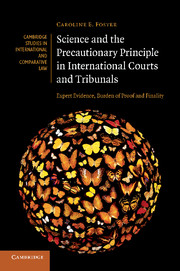 Science and the Precautionary Principle in International Courts and Tribunals
Science and the Precautionary Principle in International Courts and Tribunals Book contents
- Frontmatter
- Contents
- Preface
- Acknowledgements
- Part I Context and theory
- Part II Expert evidence
- Part III Burden of proof
- 5 Getting to the heart of the rules on burden of proof
- 6 Reversing the burden of proof to give effect to the precautionary principle
- Part IV The finality of adjudication
- Bibliography
- Index
- References
6 - Reversing the burden of proof to give effect to the precautionary principle
Published online by Cambridge University Press: 11 April 2011
- Frontmatter
- Contents
- Preface
- Acknowledgements
- Part I Context and theory
- Part II Expert evidence
- Part III Burden of proof
- 5 Getting to the heart of the rules on burden of proof
- 6 Reversing the burden of proof to give effect to the precautionary principle
- Part IV The finality of adjudication
- Bibliography
- Index
- References
Summary
Initially it would seem that applying the precautionary principle to reverse the burden of proof in international adjudication would be inconsistent with the need for certainty within the articulation and application of the rules on burden of proof, and would run counter to the presumption that states are in compliance with their international legal obligations. However, in the type of dispute under consideration in this book, justification for reversing the burden of proof can be found at both the legal and theoretical levels.
As a matter of law, the inherent powers of international courts and tribunals may include the capacity to reverse the burden of proof to accommodate the need for precaution in order to ensure the sound administration of justice. As a matter of theory, reversal of the burden of proof is consistent with the principles of fairness underlying the rules on burden of proof, and with an extended rationalist conception of adjudication. Within the extended rationalist tradition rectitude of decision (through the ‘correct application of valid law to true facts’) is an important social value, but it is not an absolute requirement for rationalist adjudication. Other values may sometimes be overriding. In this instance, these other values would include both procedural fairness and the proper protection of human health and the environment.
Rules relating to the burden and standard of proof and the application of presumptions in any event do not fit well into the rationalist category of rules that are purely procedural.
- Type
- Chapter
- Information
- Science and the Precautionary Principle in International Courts and TribunalsExpert Evidence, Burden of Proof and Finality, pp. 240 - 278Publisher: Cambridge University PressPrint publication year: 2011
